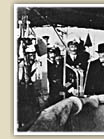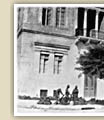
The conflict between Venizelos and King Constantine I concerning the stance of Greece
in the First World War led the Greek people to inevitable conflict.
His inability to come to an understanding with the King led Venizelos
to his decision to resign in February 1915. He returned to office with the elections
of May 1915, conducted by the provisional government
(appointed by the King) of Dimitrios Gounaris, leading the most important representative of the anti-Venizelist
bloc. The disagreement however of the two men acquired more and more significance.
The King continued to oppose by all means the policy of Venizelos causing the second
resignation of the latter in October 1915.
A period of almost dictatorial government of the country by the King, who, although weak, subjugated the government to his
will, ensued. Parliament was dissolved and Venizelist supporters
were terrorized.
The new state on the Macedonian front, which was unfavourable to the Allies,
and the estimation that the Greek territorial gains of the Balkan wars were at stake,
led a group of Venizelist officers and citizens to organize the
National Defence movement in August 1916, the objective being to bring Greece
in to the war on the side of the Entente. The surrender of the army
of Kavala to the Germans following the command of the King and the capture of Fort Ruppel
by the Bulgarians (May 1916), as well as their advance in to eastern Macedonia,
had exacerbated the situation. Venizelos transferred the provisional
government he had already formed in Crete to Thessaloniki; he had left for Crete
after his resignation in Athens.
|
 |

The triumvirate that held supreme power, Eleftherios Venizelos, Admiral Pavlos Koundouriotis
and General Panayotis Danglis, decided that Greece should enter the war on the side of the Entente.
The National Schism was fact. From October 1916 two Greek states coexisted, that of Athens
and that of Thessaloniki; the social and political clashes signalled by the Schism
also acquired a local character.
The blockade of Athens by Anglo-French troops put pressure on and threatened the population of southern Greece with famine. Popular feeling,
which at the beginning of war was in favour of the Anglo-French, shifted against them: for half the population of Greece they now become enemies.
Athens was shaken by demonstrations and counter-demonstrations, the persecutions of Venizelists, while an exceptional event, the 'anathema'
of Venizelos, took place in Athens and other cities. The refusal of the King to satisfy
the French claim to surrender destroyers, railway lines and the harbour of Piraeus lead
to the battle of Athens between the French on the one hand and the 'reservists, citizens loyal to the
King, and part of the army, on the other. The battle took place around the hill of Philopappos (November
1916). The November fighting, as these incidents were historically recorded, proved
the seriousness of the situation: the country was on the verge of civil war.
|
 |
